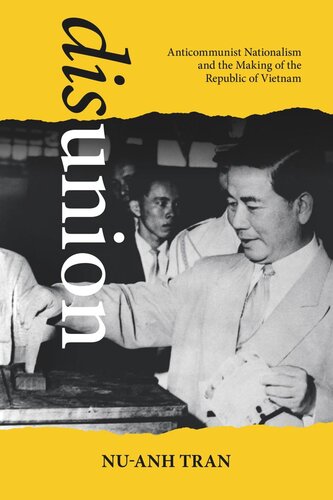

Most ebook files are in PDF format, so you can easily read them using various software such as Foxit Reader or directly on the Google Chrome browser.
Some ebook files are released by publishers in other formats such as .awz, .mobi, .epub, .fb2, etc. You may need to install specific software to read these formats on mobile/PC, such as Calibre.
Please read the tutorial at this link: https://ebookbell.com/faq
We offer FREE conversion to the popular formats you request; however, this may take some time. Therefore, right after payment, please email us, and we will try to provide the service as quickly as possible.
For some exceptional file formats or broken links (if any), please refrain from opening any disputes. Instead, email us first, and we will try to assist within a maximum of 6 hours.
EbookBell Team

4.1
40 reviewsSince the 1950s, the domestic politics of the Republic of Vietnam (RVN) has puzzled outside observers. To these external analysts, the American-backed regime seemed to be plagued by instability and factionalism for no apparent reason. Their bewilderment, however, has obscured a deep and complex history. In Disunion, Nu-Anh Tran shows how factional struggles in the Saigon-based republic reflected serious disagreements about political ideas at a pivotal moment in the lead-up to the Vietnam War.
The book traces the emergence of Vietnam’s anticommunist nationalists back to the struggle for independence and explores how their alliances were tested and then broken during the rule of the RVN’s first president, Ngô Đình Diệm. The anticommunists rejected the authoritarianism and ideology of the Vietnamese communists and dreamed of building an independent, democratic government that would unite the Vietnamese nation. The RVN was supposed to be the fulfillment of this long-cherished vision. But discord soon erupted among the anticommunists. Politicians fiercely debated to what extent the government should be democratic and which groups had a legitimate place in political life. The unresolved disagreements provoked intense and continuous infighting that troubled the RVN throughout the regime’s existence. Ultimately, the animosity undermined any possibility of realizing the anticommunists’ shared vision for the country.
Based on previously neglected primary sources and extensive research in Vietnamese and American archives, Disunion paints a rich and sensitive portrayal of leaders and activists in the RVN. Anticommunist nationalists were deeply devoted to their homeland and inspired by forward-looking visions, but they were also hobbled by their failure to live up to their lofty ideals. By examining these historical figures on their own terms, the book offers a fresh perspective on the political history of South Vietnam that has remained misunderstood to this day.